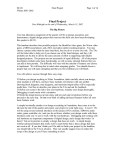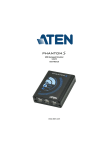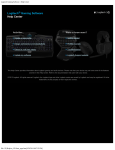Download Visual Land ME-107-L-8GB
Transcript
PRESTIGE 7 Android Tablet Guide Book Copyright © 2013 Visual Land Inc. All rights reserved. Google, Android, Gmail, Google Maps, Google Play, and other trademarks are property of Google Inc. Visual Land and the Visual Land logo are trademarks of Visual Land Inc. All other marks and trademarks are properties of their respective owners. The content of this guide including images/illustrations may differ in some details from the product or its software. All information in this document is subject to change without notice. For online Help and support, visit www.visual-land.com. ©2013 Visual Land Inc. P a g e |1 PRESTIGE 7 Android Tablet Guide Book Table of Contents 1. Get Started............................................................Page 3 2. Play & Explore.......................................................Page 4 3. Tune Performance................................................Page 14 4. Enter & Edit Text..................................................Page 18 5. Connect to Networks...........................................Page 21 6. Connect to Keyboards, Mice & Other Devices...Page 29 7. Connect to a Computer.......................................Page 31 8. Manage Accounts................................................Page 34 9.Change Backup & Reset Options.........................Page 37 10.Secure Your Tablet.............................................Page 39 11. Work With Certificates.....................................Page 43 ©2013 Visual Land Inc. P a g e |2 PRESTIGE 7 Android Tablet Guide Book 1 Getting Started Power On & Sign In To turn on your Prestige 7, press the Power button on the right edge near the top for a few seconds, then release it. Charge the battery The battery may not be fully charged at first. It’s a good idea to fully charge it as soon as you can. The Prestige 7 can be charged 2 ways. With the power adapter, connect the power adapter to the Prestige 7 and to a power outlet. With a USB, connect the included USB cable to the Prestige 7 and to a computer that is powered on. (Note: charging via USB is slower than via power adapter.) ©2013 Visual Land Inc. P a g e |3 PRESTIGE 7 Android Tablet Guide Book 2 Play & Explore Browse Home Screens To move between Home screens, swipe left or right. To resize a widget, touch & hold, then let go and drag the blue dots. To remove it, touch & hold, then drag it to the Remove icon at the top of the screen. Tap Status Bar for Notifications Notifications alert you to the arrival of new messages, calendar events, and alarms, as well as ongoing events, such as video downloads. When a notification arrives, its icon appears at the bottom of the screen. Icons for pending notifications appear on the left, and system icons showing things like Wi-Fi signal or battery strength on the right. To open the notifications shade, swipe up from the bottom or tap the bar to expand it: ©2013 Visual Land Inc. P a g e |4 PRESTIGE 7 Android Tablet Guide Book Certain notifications can be expanded to show more information, such as email previews or calendar events. To ©2013 Visual Land Inc. P a g e |5 PRESTIGE 7 Android Tablet Guide Book expand or collapse a notification, use two fingers to either swipe vertically or twist together. To open the related app, touch the notification icon on the left. Some notifications also allow you to take specific actions by touching icons within the notification. For example, Calendar notifications allow you to Snooze (remind you later) or send email to other guests. When you’re finished with a notification, just swipe it away to the left or right. If you want to dismiss all notifications, touch the Dismiss icon at the top of the notification shade. drawer. Getting Around At the bottom of every Prestige 7 screen, no matter what you’re doing, you’ll always find these three navigation buttons: Back Opens the previous screen you were working in, even if it was in a different app. Once you back up to the Home screen, you can’t go back any further in your history. ©2013 Visual Land Inc. P a g e |6 PRESTIGE 7 Android Tablet Guide Book Home Opens Home. If you’re viewing a left or right Home screen, opens the central Home screen. Recent Apps Opens a list of thumbnail images of apps you’ve worked with recently. To open an app, touch it. To remove a thumbnail from the list, swipe it left or right. After a short time without getting used, these buttons may shrink to dots or fade away, depending on the current app. To bring them back, touch their location. Touch & Type Use your fingers to manipulate icons, buttons, menus, the on-screen keyboard, and other items on the touch screen. You can also change the screen’s orientation. To select or activate something, touch it. To type something, such as a name, password, or search terms, just touch where you want to type. A keyboard pops up that lets you type into the field. ©2013 Visual Land Inc. P a g e |7 PRESTIGE 7 Android Tablet Guide Book Other common gestures include: Touch & Hold: Touch & hold an item on the screen by touching it and not lifting your finger until an action occurs. Drag: Touch & hold an item for a moment and then, without lifting your finger, move your finger on the screen until you reach the target position. For example, you can move apps around on the Home screen. Swipe or Slide: Quickly move your finger across the surface of the screen, without pausing when you first touch (so you don’t drag something instead). For example, you can slide a Home screen left or right to view the other Home screens. Double-tap: Tap quickly twice on a webpage, map, or other screen to zoom. For example, double-tap a picture in browser to zoom in, and double-tap again to zoom out. Pinch: in some apps (such as Maps, browser, and Gallery), you can zoom in and out by placing two fingers on the screen at once and pinching them together (to zoom out) or spreading them apart (to zoom in). Rotate the Screen: on most screens, the orientation of the screen rotates with your device as you turn it. You can change this in display settings. ©2013 Visual Land Inc. P a g e |8 PRESTIGE 7 Android Tablet Guide Book Settings On the All Apps screen or the Utilities home screen, notice the settings icon. This brings you to the settings screens for your tablet, where you can adjust things like network, sound, and account settings, among many others. TIP: To get to Settings quickly no matter what screen you’re on, swipe up your Notifications from the top of any screen and touch the small settings icon near the top. To change your tablet’s notification sounds, volumes, and more, go to Settings > Device > Sound. To change your tablet’s brightness, font size, and more, go to Settings > Device > Display. Lock Screen Depending how you use your tablet, you may want to set some form of automatic screen lock to prevent ©2013 Visual Land Inc. P a g e |9 PRESTIGE 7 Android Tablet Guide Book unauthorized access. if a lock has been set, the screen locks when your tablet’s display goes to sleep. When you touch the power button to wake up a locked tablet, you must take some action, ranging from a simple swipe to typing a lengthy password, to unlock it. You can set locks of different strengths using your tablet’s lock settings. To do so, go to Settings > Personal > Security > Screen lock and touch the type of lock you’d like to use. IMPORTANT: If you set a pattern or password unlock you MUST remember it. If you forget it, there is no way of unlocking your tablet without restoring it to the factory settings which will erase all data on your tablet. ©2013 Visual Land Inc. P a g e | 10 PRESTIGE 7 Android Tablet Guide Book Access Your Content To resize a widget, touch & hold, then let go and drag the blue dots. To remove it, touch & hold, then drag it to the Remove icon at the top of the screen. To add a widget, touch and hold on an empty part of the home screen, then select Widgets from the popup menu and swipe from up until you see the one you want. If there is proper space for the widget it'll be placed on the home screen. Use apps To see all your apps, touch All Apps at the bottom on any home screen. The main All Apps screen opens. This is where you can see all your apps. You can move app icons to any of your Home screens. From All Apps, you can Move Between Screens: swipe up or down. Launch an App: Touch its icon. Place an app icon on a Home screen: Touch & hold the app icon, slide your finger, and lift your finger to drop the icon in place. ©2013 Visual Land Inc. P a g e | 11 PRESTIGE 7 Android Tablet Guide Book To remove an app icon from the Home screen, touch and hold it, slide your finger toward the top of the screen, and drop the app over the Remove icon . Most apps include a Menu icon near the top or bottom of the screen that lets you control the app’s settings. Organize Your Home screens To move an app or widget icon to a different location on a Home screen: Touch & hold the icon. Slide your finger to the new position. To move between Home screens, slide toward the edge of the screen. To bump another icon out of the way, slide slowly into it. Lift your finger. The icon drops into its new position. Change sound settings Your tablet uses sounds to communicate, including notifications, alarms, and navigation feedback. ©2013 Visual Land Inc. P a g e | 12 PRESTIGE 7 Android Tablet Guide Book To customize the sounds your tablet makes, go to Settings > Device > Sound: Volumes sets the master volume separately for music, notifications, and alarms. You can still use the physical volume control on the tablet to raise or lower volume of whatever sound is currently playing. Default notification announces the arrival of notifications unless you specify a different sound in an individual app. Touch sounds give audible feedback when you touch active icons or buttons on the screen. Screen lock sound is triggered when you unlock the screen. Change the wallpaper Touch and hold on an empty part of any home screen. Select Wallpapers and a selection of thumbnails will appear. Swipe left or right to browse the available wallpapers. Tap on one to select it. Choose Set wallpaper to make the selection your wallpaper. ©2013 Visual Land Inc. P a g e | 13 PRESTIGE 7 Android Tablet Guide Book 3 Tune Performance Optimize Battery Life You can extend your battery’s life between charges by turning off features that you don’t need. You can also monitor how apps and system resources consume battery power. To control battery settings, go to Battery. Settings > Device > Extend the life of your battery If you aren’t using Wi-Fi use the Settings app to turn it off. Turn down screen brightness and set a shorter sleep timeout: Settings > Device > Display. If you know you won’t be near a mobile or Wi-Fi network for a while, switch to Airplane mode: press and hold the Power button, or go to Settings > Wireless & networks > More > Airplane mode. ©2013 Visual Land Inc. P a g e | 14 PRESTIGE 7 Android Tablet Guide Book Check battery level and usage details open Settings > Device > Battery. The list at the bottom of the screen shows the breakdown of battery usage for individual apps and services. Touch a graph for more details. The details screen for some apps includes buttons that allow you to adjust settings affecting power usage, or stop the app completely. Warning: if you stop some apps or services, your device may not work correctly. Battery status (charging, discharging) and level (as a percentage of fully charged) are displayed at the top of the screen. The discharge graph shows battery level over time since you last charged the device, and how long you’ve been running on battery power. Use the Settings Apps Screen The Apps screen allows you to adjust several aspects of the way your device uses memory. To view these settings, go to Settings > Wireless & networks > Data usage. You’ll see three tabs at the top of the screen, each displaying a list of apps or their components: ©2013 Visual Land Inc. P a g e | 15 PRESTIGE 7 Android Tablet Guide Book Downloaded. Displays apps you’ve downloaded Running. Displays all apps, processes, and services that are currently running or that have cached processes, and how much RAM they are using. The graph at the bottom of the Running tab shows the total RAM in use and the amount free. At the top right of the screen, touch Show cached processes or Show running services to switch back and forth. All. Displays all apps that came with Android and all apps you downloaded on Google Play or other sources. To view details about an app or other item listed under any tab, touch its name. The information and controls available vary among different types of apps, but commonly include: Force stop button: stops an app that is misbehaving. stopping an app, process, or service may cause your device to stop working correctly. You may need to restart your device after doing this. Uninstall button: deletes the app and all of its data and settings. ©2013 Visual Land Inc. P a g e | 16 PRESTIGE 7 Android Tablet Guide Book Disable button: Prevents the app from running, but does not uninstall it. This option is available for some apps and services that can’t be uninstalled. Clear data button: Delete an app’s settings and other data without removing the app itself. Clear cache: if the app stores data in a temporary area of the tablet’s memory, lists how much information is stored, and includes a button for clearing it. Launch by default: If you have configured an app to launch certain file types by default, you can clear that setting here. Permissions: Lists the kinds of information about your tablet and data the app has access to. ©2013 Visual Land Inc. P a g e | 17 PRESTIGE 7 Android Tablet Guide Book 4 Enter & Edit Text Use the keyboard You can enter text using the onscreen keyboard. some apps open it automatically. in others, you open it by touching where you want to type. To make the keyboard go away, touch the modified back button below it. Basic editing ©2013 Visual Land Inc. P a g e | 18 PRESTIGE 7 Android Tablet Guide Book Move the insertion point: Touch where you want to type. The cursor blinks in the new position, and a green tab appears below it. Drag the tab to move the cursor. Select text: Touch & hold or double-tap within the text. The nearest word highlights, with a tab at each end of the selection. drag the tabs to change the selection. The tab disappears after a few moments, to get out of your way. To make it reappear, touch the text again. Delete text: Touch to delete selected text or the characters before the cursor. Type capital letters: Touch the shift key once to switch to capital letters for one letter. Or touch & hold shift key while you type. When you release the key, the lowercase letters reappear. Turn caps lock on: double-tap or touch & hold shift key, so it changes to . Touch shift key again to return to lowercase. Cut, copy, paste: select the text you want to manipulate. Then touch Cut, Copy or Paste button: ©2013 Visual Land Inc. P a g e | 19 PRESTIGE 7 Android Tablet Guide Book ©2013 Visual Land Inc. P a g e | 20 PRESTIGE 7 Android Tablet Guide Book 5 Connect to Networks Wi-Fi is a wireless networking technology that can provide internet access at distances of up to 100 meters, depending on the Wi-Fi router and your surroundings. To use Wi-Fi, you connect to a wireless access point, or “hotspot.” Some hotspots are open and you can simply connect to them. Others implement security features that require other steps to set up, such as digital certificates or other ways to ensure that only authorized users can connect. To extend the life of your battery between charges, turn off Wi-Fi when you’re not using it. You can also set your device to disconnect automatically from Wi-Fi networks when it’s sleeping. To work with Wi-Fi settings, go to & networks > Wi-Fi. Settings > Wireless Turn Wi-Fi on & connect to a Wi-Fi network If you’re adding a Wi-Fi network when first setting up your device touch Settings > Wireless & networks > Wi-Fi. ©2013 Visual Land Inc. P a g e | 21 PRESTIGE 7 Android Tablet Guide Book Slide the Wi-Fi switch to the on position. The device scans for available Wi-Fi networks and displays the names of those it finds. Secured networks are indicated with a Lock icon. If the device finds a network that you connected to previously, it connects to it. Touch a network name to see more details or connect to it, and type a password if necessary or, if your Wi-Fi router supports Wi-Fi Protected setup, touch the WPs icon on your tablet, and then touch the same button on your router. To modify a network’s settings, touch & hold the network name. Add a Wi-Fi network You can add a Wi-Fi network so your device will remember it, along with any security credentials, and connect to it automatically when it’s in range. You must also add a Wi-Fi network if the network does not broadcast its name (ssid), or to add a Wi-Fi network when you are out of range. To join a secured network, you first need to learn security details from the network’s administrator. ©2013 Visual Land Inc. P a g e | 22 PRESTIGE 7 Android Tablet Guide Book Turn on Wi-Fi, if it’s not already on. Touch the Plus icon at the top of the screen. Enter the ssid (name) of the network. if necessary, enter security or other network configuration details. Touch Save. The information about the network is saved. Your device will connect to this network automatically the next time you come within range. Forget a Wi-Fi network You can make the tablet forget about the details of a Wi-Fi network that you added—for example, if you don’t want the tablet to connect to it automatically or if it’s a network that you no longer use. Turn on Wi-Fi, if it’s not already on. In the Wi-Fi settings screen, touch the name of the network. Touch Forget in the dialog that opens. Configure proxy settings for a Wi-Fi network Some network administrators require you to connect to internal or external network resources via a proxy server. by default, the Wi-Fi networks you add are not configured to connect via a proxy, but you can change that for each Wi-Fi network you’ve added. ©2013 Visual Land Inc. P a g e | 23 PRESTIGE 7 Android Tablet Guide Book Proxy settings are used by browser but may not be used by other apps. Touch & hold a network in the list of Wi-Fi networks you’ve added. Touch Modify network in the dialog that opens. Select Show advanced options. If the network has no proxy settings, touch none under Proxy settings, then touch Manual in the menu that opens. Enter the proxy settings supplied by your network administrator. Touch Save. The proxy settings apply only to the Wi-Fi network you modified. To change the proxy settings for other Wi-Fi networks, modify them individually. Set Wi-Fi Notifications, Disconnect Policy, & Other Advanced Options To work with advanced Wi-Fi settings: Turn on Wi-Fi, if it’s not already on. In the Wi-Fi settings screen, touch Menu icon > Advanced. These are the settings you can adjust: ©2013 Visual Land Inc. P a g e | 24 PRESTIGE 7 Android Tablet Guide Book Network notification: by default, when Wi-Fi is on, you receive notifications in the Status bar when your device detects an open Wi-Fi network. uncheck this option to turn off notifications. Keep Wi-Fi during sleep: To conserve mobile data usage, your device stays connected to Wi-Fi when the screen goes to sleep. Touch this option to change this default behavior: either to stay connected to Wi-Fi only when the device is connected to a charger (when battery life isn’t a problem), or never to stay connected to Wi-Fi during sleep. This screen also displays the following information: MAC address: The Media Access Control (MAC) address of your device when connected to a Wi-Fi network. IP address: The internet Protocol (IP) address assigned to the device by the Wi-Fi network you are connected to (unless you used the IP settings to assign it a static IP address). To turn Wi-Fi on or off, go to networks > Wi-Fi. ©2013 Visual Land Inc. Settings > Wireless & P a g e | 25 PRESTIGE 7 Android Tablet Guide Book To manage mobile data options, go to Wireless & networks > Data usage. Settings > Connect to Virtual Private Networks Virtual private networks (VPNs) allow you to connect to the resources inside a secured local network, from outside that network. VPNs are commonly deployed by corporations, schools, and other institutions to let people access local network resources when not on campus, or when connected to a wireless network. To configure VPN access, you must first obtain the details from your network administrator. Depending on your organization’s solution, you may need to obtain a VPN app from your administrator. The VPN settings screen allows you to add VPN networks and adjust their settings. To view this screen and perform the tasks described here, go to Settings > Wireless & networks > More > VPN. Add a VPN From the VPN screen, touch Add VPN profile. ©2013 Visual Land Inc. P a g e | 26 PRESTIGE 7 Android Tablet Guide Book In the form that appears, fill in the information provided by your network administrator. Touch Save. The VPN is added to the list on the VPN screen. Connect to a VPN From the VPN screen, touch the name of the VPN. In the dialog that opens, enter any requested credentials. Touch Connect. When you’re connected to a VPN, a Status icon and notification are displayed continuously. To disconnect, touch the notification for the VPN connection. Edit a VPN From the VPN screen, touch & hold the name of the VPN profile. In the dialog that opens, touch Edit profile. Edit the VPN settings you want. Touch Save. Delete a VPN From the VPN screen, touch & hold the name of the VPN profile. Touch & hold the VPN you want to delete. In the dialog that opens, touch Delete profile. Control Airplane Mode & Other Network Settings ©2013 Visual Land Inc. P a g e | 27 PRESTIGE 7 Android Tablet Guide Book These settings are available under Settings > Wireless & networks > More. Follow the links for detailed instructions: Airplane Mode. Check to turn off all data transmission from the device. VPN. Touch to adjust settings that allow you to connect to websites and other resources within a secured local network from outside that network. see “Connect to virtual private networks” on page 59. ©2013 Visual Land Inc. P a g e | 28 PRESTIGE 7 Android Tablet Guide Book 6 Connect to Keyboards, Mice, & Other Devices You can connect a keyboard, mouse, or even a joystick or other input device to your tablet via usb and use it just as you would with a PC. You may need the provided adapter to connect the keyboard or other device to your tablet’s USB port. To connect more than one USB device at a time, use a powered usb hub to reduce the drain on your tablet’s battery. Keyboards In addition to entering text, you can use your keyboard to navigate your tablet’s features: Use the arrow keys to select items on screen. Pressing Return when an item is selected is equivalent to touching that item. Pressing escape is equivalent to touching back. ©2013 Visual Land Inc. P a g e | 29 PRESTIGE 7 Android Tablet Guide Book Press Tab or Shift-Tab to move from field to field in a form or other screen with multiple text fields. Mice When you connect a mouse to your tablet and move the mouse, an arrow-shaped cursor appears, just as on a computer: Use the mouse to move the cursor. Clicking, pressing, and dragging with the mouse button is equivalent to touching, touching & holding, and dragging with your finger. Only one mouse button is supported. If your mouse has a trackball or scroll wheel, you can use it to scroll both vertically and horizontally. Other Input Devices You can connect joysticks, gamepads, and other input devices to your tablet. if they work without special drivers or adapters on your PC, they will likely work with your tablet. However, games and other apps must be designed to support any special features of an input device, such as dedicated buttons or other controls, to take full advantage of them. ©2013 Visual Land Inc. P a g e | 30 PRESTIGE 7 Android Tablet Guide Book 7 Connect to a Computer Connect to a Windows Computer via USB You can use a usb cable to connect your tablet to a Windows computer and transfer music, pictures, and other files in both directions. This connection uses the MTP protocol, which is supported by most recent versions of Windows. When you connect your tablet to the usb port on your computer, its usb storage is mounted as a drive and appears on your computer screen. You can now copy files back and forth as you would using any other external device. When you’re finished, simply disconnect the tablet by unplugging the usb cable. To change your tablet’s USB connection options, go to Settings > Device > Storage > Menu > USB computer connection. Connect to a Macintosh computer via USB ©2013 Visual Land Inc. P a g e | 31 PRESTIGE 7 Android Tablet Guide Book You can use a usb cable to connect your tablet to a computer running Mac OS X with a usb cable and transfer music, pictures, and other files in both directions. This connection uses the MTP protocol, which is not supported by Mac OS X natively. Therefore, you first need to install the free Android File Transfer application on your Macintosh. It’s available from www.android.com/filetransfer, along with instructions on how to install it. After you install Android File Transfer, follow these steps: 1. If you are using Android File Transfer for the first time, double-click it to open it. After you start Android File Transfer once, it opens automatically whenever you connect your device to your computer. 2. Connect your device to your computer with a usb cable. Android File Transfer starts, if it’s not already running, and opens a window that displays the contents of your device, along with storage space details at the bottom of the window. ©2013 Visual Land Inc. P a g e | 32 PRESTIGE 7 Android Tablet Guide Book You work with this window much as if it were a Finder window: opening and closing folders, creating new folders, and dragging files to or from it and other Finder windows. Disconnect the USB cable when you’re finished. To change your tablet’s USB connection options, go to Settings > Device > Storage > Menu > USB computer connection. ©2013 Visual Land Inc. P a g e | 33 PRESTIGE 7 Android Tablet Guide Book 8 Manage Accounts Add or remove accounts You can use multiple Google Accounts and Microsoft exchange Activesync accounts on your device. You may also be able to add other kinds of accounts, depending on your apps. Some you can add in the Accounts section of settings, as described here. Others you add using an app that works with those kinds of accounts. For example, you can add IMAP and POP3 email accounts with the email app. To reach the settings described here, start from Settings > Accounts. Add an Account To add some accounts, you may need to obtain details from system administrator about the service to which the account connects. For example, you may need to know the account’s domain or server address. ©2013 Visual Land Inc. P a g e | 34 PRESTIGE 7 Android Tablet Guide Book Go to Settings > Accounts > Add account. Touch the kind of account to add. Follow the on-screen instructions. Most accounts require a username and password, but the details depend on the kind of account and the configuration of the service you’re connecting to. Depending on the kind of account, you may be asked to configure what kinds of data you want to sync, name the account, and other details. When you’re finished, the account is added in one of two places: Google Accounts show up under Settings > Accounts > Google. Other accounts show up under Accounts on the main settings screen. Remove an Account You can remove any account and all information associated with it from your device, including email, contacts, settings, and so on. To remove a Google account, touch account. ©2013 Visual Land Inc. Menu > remove P a g e | 35 PRESTIGE 7 Android Tablet Guide Book For any other type of account go, to Settings > Accounts > account-name and look for the Remove option. ©2013 Visual Land Inc. P a g e | 36 PRESTIGE 7 Android Tablet Guide Book 9 Change Backup & Reset Options You can back up settings and other data associated with one or more of your Google Accounts. if you need to replace or factory reset your device, you can restore your data for any accounts that were previously backed up. To view the settings described here, go to Backup & Reset. Settings > These options are available: Back Up My Data. If you check this option, a wide variety of your personal data is backed up automatically, including your Wi-Fi passwords, Browser bookmarks, a list of the apps you’ve installed, the words you’ve added to the dictionary used by the onscreen keyboard, and most of your customized settings. some third-party apps may also take advantage of this feature, so you can restore your data if you reinstall an app. If you uncheck this option, your data stops getting backed up, and any existing backups are deleted from Google servers. Backup Account. Displays the Google Accounts whose information gets backed up. You must sign in with one or ©2013 Visual Land Inc. P a g e | 37 PRESTIGE 7 Android Tablet Guide Book more of these accounts on a new or reset device to retrieve the associated information. To add a new account, touch Backup account > Add account. Automatic restore. Check this option to restore settings and other data when you reinstall an app. This feature requires that you are backing up your data with your Google Account and that the app is using the backup service. Factory data reset. Touch this option, then reset tablet to erase all your personal data from internal storage, including information about your Google Account, any other accounts, your system and app settings, any downloaded applications, and your music, photos, videos, and other files. After resetting your tablet, you’ll need to re-enter the same information requested when you first set up your tablet. If you’ve been backing up your data to a Google account, an option during the setup process allows you to restore it. Some third-party apps also make use of the backup service, so if you reinstall one, its settings and data are restored. ©2013 Visual Land Inc. P a g e | 38 PRESTIGE 7 Android Tablet Guide Book 10 Secure Your Tablet Set Screen Lock Depending how you use your tablet, you may want to set some form of automatic screen lock to prevent unauthorized access. If a screen lock has been set, the screen locks when your tablet’s display goes to sleep. If your tablet’s playing music when the screen locks, you can continue listening or pause the selection without unlocking. To adjust your lock settings: 1. Go to Settings > Personal > Security > Screen lock. 2. Touch the type of lock you want and follow the onscreen instructions. If you have previously set a lock, you must enter the pattern, PIN, or password to unlock the lock settings. You can choose among these lock options, listed in approximate order of strength: ©2013 Visual Land Inc. P a g e | 39 PRESTIGE 7 Android Tablet Guide Book Slide provides no protection, but lets you get to the Home screen quickly, or open Camera and start taking pictures immediately. Pattern lets you draw a simple pattern with your finger to unlock the phone. This is more secure than Slide unlock. PIN requires four or more numbers. Longer PINs tend to be more secure. Password requires four or more letters or numbers. This is the most secure option, as long as you create a strong password. Password tips: For best security, specify a password that is at least 8 characters long, contains a mixture of numbers, letters, and special symbols and doesn’t contain any recognizable words or phrases. To change when your phone goes to sleep, go to Settings > Device > Display > Sleep. To see your passwords when you input them, go to Settings > Personal > Security > Make passwords visible. Encrypt your Tablet You can encrypt all the data on your tablet: Google Accounts, app data, music and other media, downloaded ©2013 Visual Land Inc. P a g e | 40 PRESTIGE 7 Android Tablet Guide Book information, and so on. if you do, you must enter a numeric PIN or password each time you turn on your tablet. Note that this is the same PIN or password that you use to unlock your tablet without encryption, and cannot be set independently. Warning: encryption is irreversible. The only way to revert to an unencrypted tablet is to perform a factory data reset, which erases all your data. Encryption provides additional protection in case your tablet is stolen, and may be required or recommended in some organizations. Consult your system administrator before turning it on. in many cases the PIN or password you set for encryption is controlled by the system administrator. Before turning on encryption, prepare as follows: Set a lock screen PIN or password. Charge the battery. Plug in your tablet. Schedule an hour or more for the encryption process: you must not interrupt it or you will lose some or all of your data. ©2013 Visual Land Inc. P a g e | 41 PRESTIGE 7 Android Tablet Guide Book When you’re ready to turn on encryption: Touch Settings > Personal > Security > Encryption > Encrypt tablet. Read the information about encryption carefully. The Encrypt Tablet button is dimmed if your battery’s not charged or your tablet’s not plugged in. If you change your mind about encrypting your tablet, touch the back button. Warning: if you interrupt the encryption process, you will lose data. Touch Encrypt tablet. Enter your lock screen PIN or password and touch Continue. Touch Encrypt Tablet again. The encryption process starts and displays its progress. encryption can take an hour or more, during which time your tablet may restart several times. When encryption is complete, you’re prompted to enter your PIN or password. subsequently, you must enter your PIN or password each time you power on your tablet, to decrypt it. ©2013 Visual Land Inc. P a g e | 42 PRESTIGE 7 Android Tablet Guide Book 11 Work with Certificates You can use digital certificates to identify your device for a variety of purposes, including VPN or Wi-Fi network access as well as authentication to servers by apps such as email or browser. To use a certificate to identify your device, you must obtain it with help from your system administrator, and install it in your device’s trusted credential storage . Android supports DER-encoded X.509 certificates, saved in files with a .crt or .cer file extension. If your certificate file has a .der or other extension, you must change it to .crt or .cer or you won’t be able to install it. Android also supports X.509 certificates saved in PKCS#12 key store files with a .p12 or .pfx extension. If your key store has some other extension, you much change it to .p12 or .pfx or you won’t be able to install it. When you install a certificate from a PKCS#12 key store, Android also installs any accompanying private key or certificate authority certificates. Install Client & CA Certificates ©2013 Visual Land Inc. P a g e | 43 PRESTIGE 7 Android Tablet Guide Book To install a certificate from your tablet’s internal storage: Copy the certificate or key store from your computer to the root of your device’s internal storage (that is, not in a folder). Touch Settings > Personal > Security > Credential storage > Install from storage. Touch the filename of the certificate or keystore to install. Only certificates that you haven’t already installed are displayed. If prompted, enter the key store password and touch OK. Enter a name for the certificate and touch OK. Typically, a CA certificate included with a client certificate is installed at the same time. You can also install separate CA certificates using the same steps. if you have not already set a pattern, PIN, or password for your device, you’re prompted to set one up. The type of lock that’s acceptable may be predetermined by your system administrator. You can now use the certificate that you installed when connecting to a secure network or for client authentication with email, Browser, and third-party apps. After a certificate is installed successfully, the copy in storage is deleted. ©2013 Visual Land Inc. P a g e | 44 PRESTIGE 7 Android Tablet Guide Book Warning: Apps such as email and browser that support certificates allow you to install certificates directly from within the app. For details, see the Help or other instructions that come with each app. Work with CA Certificates If a certificate authority (CA) certificate gets compromised, or for some other reason your organization doesn’t want to trust it, you can disable or remove it. To do so, follow these steps: 1. Touch Settings > Personal > Security > Credential storage >Trusted credentials. The trusted credentials screen has two tabs: System displays certificate authority (CA) certificates that are permanently installed in the RoM of your tablet. User displays any CA certificates that you have installed yourself, for example in the process of installing a client certificate. To examine the details of CA certificate, touch its name. A scrolling screen displays the details. ©2013 Visual Land Inc. P a g e | 45 PRESTIGE 7 Android Tablet Guide Book To remove or disable a CA certificate, scroll down to the bottom of the details screen and touch either Disable for system certificates or remove for user certificates. When you disable a system CA certificate, the button at the bottom of its details screen changes to Enable, so you can enable the certificate again if necessary. When you remove a user-installed CA certificate, it is gone permanently and must be re-installed if you want it back. In the confirmation dialog that appears, click OK. ©2013 Visual Land Inc. P a g e | 46 PRESTIGE 7 Android Tablet Guide Book Safety Information • • • • • • • • • The battery is not intended to be replaced by the consumer. If you believe the battery is damaged or needs to be replaced, contact Visual Land customer support for inspection and/or replacement. Do not let the battery come in contact with liquids. Do not place your device near a heat source or leave it in your car in high temperatures. Do not dispose of the battery in a fire. Avoid dropping device. Never use any charger or battery that is damaged in any way. Use only the provided charger which is specifically designed for your device. Do not use if screen is cracked or broken as this could cause injury to you. Please note that a touch screen responds best to a light touch from the pad of your finger or a non-metallic, no sharp stylus. Using excessive force or hard or sharp objects when pressing on the touch screen may damage the tempered glass surface and void the warranty. Do not set the volume at its highest levels when using headphones. Prolonged exposure to loud noise could damage your hearing. FCC Compliance This device complies with Part 15 of the FCC Rules. Operation is subject to the following two conditions: (1) this device may not cause harmful interference, and (2) this device must accept any interference received, including interference that may cause undesired operation. FCC Radiation Exposure Statement: This equipment complies with FCC RF radiation exposure limits set forth for an uncontrolled environment. This transmitter must not be co-located or operating in conjunction with any other antenna or transmitter. ©2013 Visual Land Inc. P a g e | 47 PRESTIGE 7 Android Tablet Guide Book ©2013 Visual Land Inc. P a g e | 48



























































